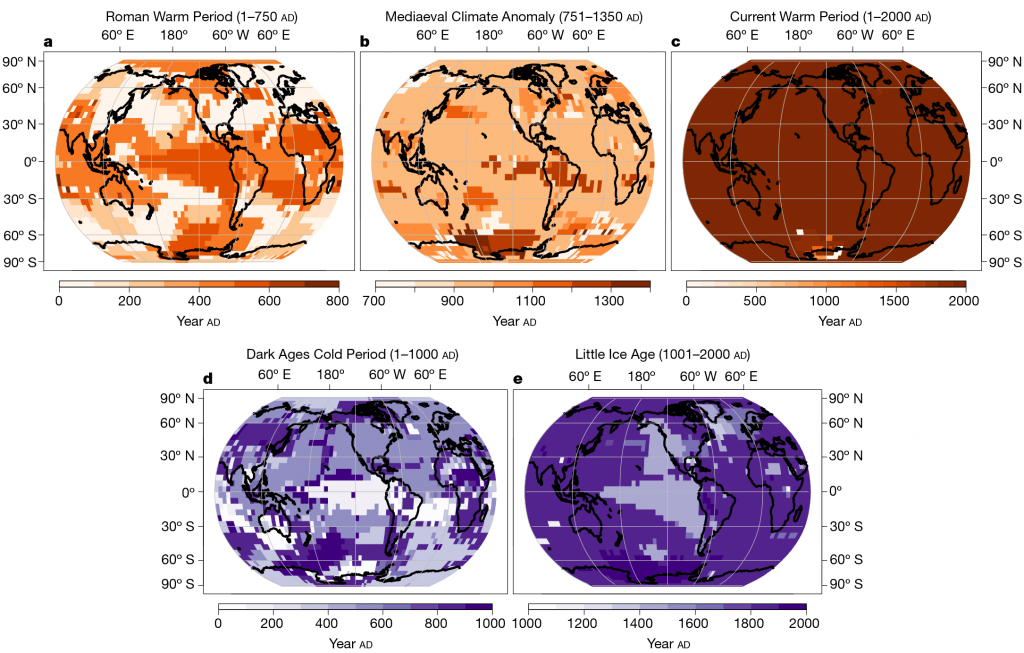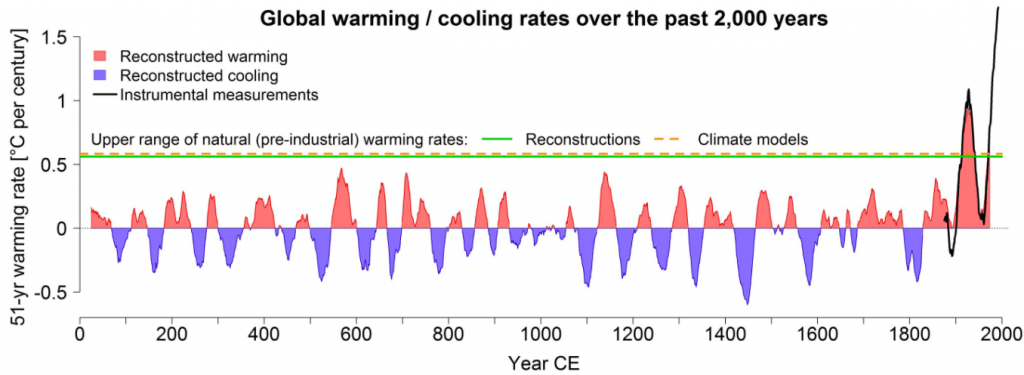
Flawed Reasoning: Natural climate change events in the past do not provide evidence that human emissions of greenhouse gas are incapable of changing the climate today.

REVIEW
CLAIM: A graph of the Earth’s mean temperature over the last 2,000 years shows two previous periods when temperatures were warmer than they are now; from 1–200 A.D., an epoch called the Roman Warm Period, and more recently the Medieval Warm Period from 900–1100 A.D.[…] It is worth noting that both of these climate optima occurred centuries before the discovery of fossil fuels and the invention of the internal combustion engine.
Following a correction posted by 27 July, Townhall has now retracted this article, replacing it with this short message: “An earlier version of this column incorrectly cited a graph of the Earth’s mean temperature over the last 2,000 years showing two previous periods when temperatures were warmer than they are now; from 1–200 A.D., an epoch called the Roman Warm Period, and more recently the Medieval Warm Period from 900–1100 A.D.” You can read the updated version here and the original version here.
A recent study1 working with a global database of paleoclimate records found that no previous warm or cool period in the last 2,000 years—including the Roman Warm Period and the Medieval Warm Period (also called the Medieval Climate Anomaly)—occurred globally and synchronously. But 20th Century temperatures were the warmest of the last 2,000 years for nearly the entire surface of the Earth.

Source: Neukom et al (2019)1

Source: University of Bern
- 1- Neukom et al (2019) No evidence for globally coherent warm and cold periods over the preindustrial Common Era, Nature
Kevin Anchukaitis, Associate Professor, The University of Arizona:
1) It is entirely unclear what graph (“A graph of the Earth’s mean temperature over the last 2,000 years”) the author of the op-ed is referring to (it doesn’t appear to be included or appear in the op-ed).
2) Our most up-to-date understanding of global mean temperatures is likely the Last Millennium Reanalysis1. Even accounting for uncertainties, global mean annual temperatures are higher now than any time in the last 2,000 years, with the middle of the 20th century either matching or exceeding Common Era temperatures as well.
3) For the Northern Hemisphere (where we have much better proxy data and a better understanding of the uncertainties), we come to similar conclusions—in Wilson et al (2016)2 we find that the two warmest decades of our reconstruction (from 918 to 2004 CE) were 1994–2003 and 1946–1955. Coming in 3rd place is 1161–1170 CE. So, the latest in large-scale temperature reconstructions do NOT support a claim that temperatures either in the Medieval or Roman periods were warmer than today.
4) Even if these periods were warmer than today (and we currently have no evidence that they were), that would have no bearing on whether CO2 is causing current warming. Current warming is unambiguously caused by CO2 emissions. Past warm and cold periods reflect a mix of internal climate system variability and changes in radiative forcing from volcanoes and solar variability. Current warming is the result of rising atmospheric CO2 concentration, whether or not there were past epochs of widespread warming.
- 1- Tardif et al (2019) Last Millennium Reanalysis with an expanded proxy database and seasonal proxy modeling, Climate of the Past
- 2- Wilson et al (2016) Last millennium northern hemisphere summer temperatures from tree rings: Part I: The long term context, Quaternary Science Reviews
Rob Wilson, Professor, University of St Andrews:
Since 2015, several tree-ring based studies of large-scale Northern Hemisphere summer temperatures have shown that the last 10 or 20 year periods are significantly warmer than any other time for the last 1,200 years. A recent study in Nature1 has expanded on this work using a global multi-proxy data-set which suggests that the last 50 years have been warmer than any period of the last 2,000 years.
The statement above is therefore incorrect and mis-characterises what is detailed in many studies. In fact, basic conclusions have been rather consistent over the past 20 years—i.e., recent warming is unprecedented for the last millennium (likely for last 2,000), the Sun has almost no detectable attributed impact on climate, and volcanoes have the strongest impact on climate prior to the anthropogenic period. Our knowledge of past climate is better where we have data and poor where we rely on teleconnections and/or interpolation.
However, the paleoclimate community and users of the data we generate must appreciate that the 1st millennium of the Common Era is substantially much less constrained than the last 1,000 years and more effort and investment is needed to increase the number of climate proxy records for this earlier period (also the Medieval). Ideally, we should not mix proxy records that express different signals as the climate response to both internal and external forcing varies across different seasons (i.e., summer vs. winter). I would also contentiously add that for the late Holocene, we should minimise the use of proxy archives with poor (>10 years) resolution and substantial (+/- 5-10 years) dating uncertainties.
- 1- Neukom et al (2019) No evidence for globally coherent warm and cold periods over the preindustrial Common Era, Nature


